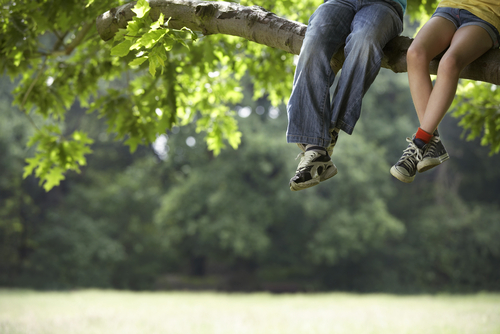Richard Louv, whose pivotal book Last Child in the Woods looks
squarely at a condition he calls “nature deficit disorder,” says that
this isn’t good for the species as a whole, but it’s especially harmful
for children. Throughout human history and prehistory, he says,
“children spent much if not most of their developing years either
working or playing outside.” In less than three decades, “we’re seeing
the diminishment and perhaps the disappearance of that.”
According to Louv, there is a theory called the biophilia hypothesis
that says that for all our modern technological savvy, at a biological
level we are still hunters and gatherers. At some level we
don’t understand, he says, human beings need a direct connection to
nature.
“We need to see natural shapes in the horizon.
And when we don’t get that, we don’t do so well.”
One of the goals of this book is to show the earth as something
more than the raw materials we gather from it, to see it as the fount
of life, what British research scientist James Lovelock called Gaia,
a giant living organism. To be so disconnected from it as to have
no sense of its presence everywhere in our lives is to lose one of the
most primal balancing components of our bodies and spirits.
We live in an age of hyperconsumerism. The contents of our
meals travel an average of 1,500 miles before reaching our plates.
We take for granted the ability to make trips in an afternoon that
would have required weeks of laborious, dangerous travel barely a
century ago. We talk, play games, and text with people around the
world on small, hyper-capable devices that didn’t exist a decade ago.
Some experts estimate that we consume more energy in five minutes
than our cave-dwelling ancestors did in an entire year.
We used to be an agriculture-based culture. Now giant combines
do the work our hands used to do. Technology has made the
job of raising and transporting our food much more efficient. But
this efficiency has come at a high cost: not only has it compromised
and exhausted our soil and water resources, it has also polluted
our air and land with staggering quantities of toxins and unknown
change agents. Some experts believe it has disoriented, exhausted,
and poisoned the very bees we count on to pollinate our food crops.
The effect on our own bodies and DNA is,
quite literally, unknown.
In an endless Möbius strip of cause and effect, this industrialization
of farming has also made us lose touch with what we come
from. We have become removed from the earth, blind and deaf to
her cries. Today we live in a totally new paradigm, often many stories
above the earth in a hermetically sealed room with no access to
fresh air or any way to feel what is beneath our feet.
In 2005, the Dalai Lama spoke at a weekend conference on healing
in Washington, DC. His topic was the growing convergence of
science and spirituality, how practices like meditation naturally dovetail
with healing. His Holiness referred to a graph that showed that
as the U.S. Gross Domestic Product—the traditional way we measure
our economic health—has risen in the last fifty years, it has been mirrored
by a corresponding increase not only in depression but also in
the use of the drugs that treat this ailment and the conditions related
to it. In other words, as our consumption of goods has risen, our levels
of contentment have headed in the other direction. As we devour
more, we are not only not satisfied, we are more starved.
What the Dalai Lama talked about is rampant.
Enter the giveaway…
[dynamic-sidebar id=’Custom Widget 2′]

Green Diva Meg
July 30, 2014 at 12:18 pm
this book has such warmth, depth and hope. even in the midst of our environmental trauma, there is so much goodness. such a wonderful reminder to stay connected to nature!
Pingback: Earth Calling - Excerpt & Giveaway | Earth Calling
Anne
July 31, 2014 at 7:13 am
I’ve known Ted since he was a teen-ager. Thrilled to be able to read this excerpt of his book. He is an exceptional person!
Pingback: Earth Calling: The "Silent Spring" for the 21st Century - myEARTH360 (the blog)